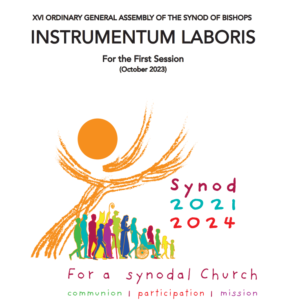 October 2023 will begin a process of communal discernment in a month-long Vatican assembly of Bishops, Cardinals, Priests, Consecrated, and Lay People representing the experiences of the whole People of God at the Synod on Synodality. Throughout this two year process, their guiding document will be the Instrumentum Laboris, a document which was compiled from the sharing of millions of Catholics worldwide participating in the Continental Stage of the Synod (including those from our own Collaborative – if you haven’t already done so, we invite you to read our Collaborative Synod Synthesis.)
October 2023 will begin a process of communal discernment in a month-long Vatican assembly of Bishops, Cardinals, Priests, Consecrated, and Lay People representing the experiences of the whole People of God at the Synod on Synodality. Throughout this two year process, their guiding document will be the Instrumentum Laboris, a document which was compiled from the sharing of millions of Catholics worldwide participating in the Continental Stage of the Synod (including those from our own Collaborative – if you haven’t already done so, we invite you to read our Collaborative Synod Synthesis.)
For the first time in history, women (more than 50!) will be voting delegates of the Synod. A significant area of focus for the Synod will be the equal baptismal dignity of Women in the Church, and how to enable structures for greater recognition and participation, including governance and decision-making.
“The synod now taking place is – and should be – a journey in accordance with the Spirit, not a parliament for demanding rights and claiming needs in accordance with the agenda of the world, nor an occasion for following wherever the wind is blowing, but the opportunity to be docile to the breath of the Holy Spirit,” said Pope Francis.
During the first phase of the Synod, questions of women’s participation and recognition, of mutually supportive relationships between men and women, and of the desire for a greater presence of women in positions of responsibility and governance, emerged as crucial elements in the search for more synodal ways to live the Church’s mission. Many participants expressed a clear desire that society and the Church be places of growth, active participation and healthy belonging for all women. They ask the Church to be at their side to accompany and promote the realization of this. A synodal Church must address these questions together, seeking responses that offer greater recognition of women’s baptismal dignity and rejection of all forms of discrimination and exclusion faced by women in the Church and society.
The suggestions for prayer and reflection below are from Instrumentum Laboris (page 42) We invite you to take these to your own personal prayer and to your spiritual conversations with one another.
Suggestions for Prayer and Preparatory Reflection
1) Women play a major role in transmitting the faith in families, Parishes, consecrated life, associations and movements and lay institutions, and as teachers and catechists. How can we better recognise, support, and accompany their already considerable contribution? How can we enhance it in order to learn to be an increasingly synodal Church?
2) The charisms of women are already present and at work in the Church today. What can we do to discern and support them and to learn what the Spirit wants to teach us through them?
3) All Continental Assemblies call for the issue of women’s participation in governance, decisionmaking, mission and ministries at all levels of the Church, to be addressed, and for this participation to be given the support of appropriate structures so that this does not remain just a general aspiration.
- How can women be included in these areas in greater numbers and new ways?
- How, in consecrated life, can women be better represented in the Church’s governance and decision-making processes, better protected from abuse in all ecclesial contexts, and, where relevant, more fairly remunerated for their work?
- How can women contribute to governance, helping to promote greater accountability and transparency and strengthen trust in the Church?
- How can we deepen reflection on women’s contribution to theological reflection and the accompaniment of communities? How can we give space and recognition to this contribution in the formal processes of discernment at every level of the Church?
- What new ministries could be created to provide the means and opportunities for women’s effective participation in discernment and decision-making bodies? How can co-responsibility in decision-making processes be increased between lay and consecrated women and clergy in remote places and in challenging social contexts where women are frequently the main agents of pastoral care and evangelisation? The contributions received during the first phase note that tensions with the ordained Ministers arise where the dynamics of co-responsibility and shared decision-making processes are absent.
4) Most of the Continental Assemblies and the syntheses of several Episcopal Conferences call for the question of women’s inclusion in the diaconate to be considered. Is it possible to envisage this, and in what way?
5) How can men and women better cooperate in pastoral ministry and exercising related responsibilities?
